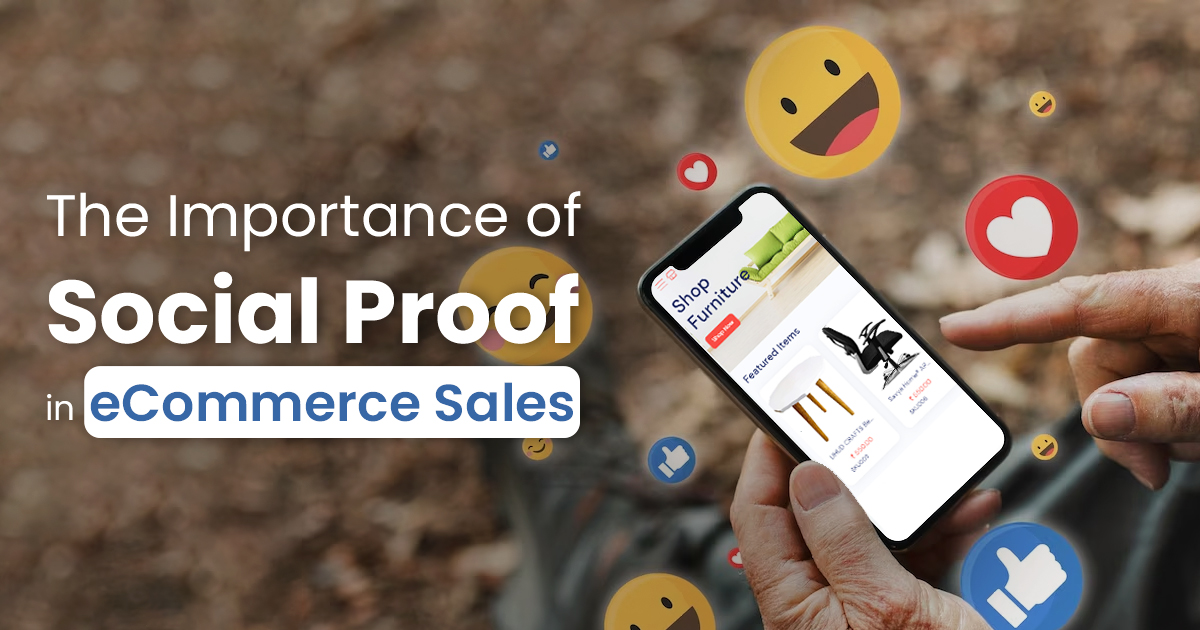The Importance of Social Proof in eCommerce Sales

In the world of eCommerce, social proof has become a critical factor in driving sales. Social proof refers to the concept that people are more likely to take a certain action if they see others taking that same action.
In the context of eCommerce, social proof can take many forms, from customer reviews and ratings to user-generated content on social media platforms. In this article, we’ll explore why social proof is so important in eCommerce, and how eCommerce businesses can leverage social proof to increase sales and build trust with their customers.
Why does Social Proof matter in eCommerce?
In a world where consumers are bombarded with choices and information, social proof can be a powerful tool for eCommerce businesses looking to stand out and build trust with their customers. Here are just a few reasons why social proof matters in eCommerce:
1. Builds Trust
When consumers are considering making a purchase online, they often face a sense of uncertainty and risk. They may be unsure if the product they’re considering is high quality if it will meet their needs, or if the company they’re considering purchasing from is reputable. Social proof can help to alleviate these concerns by providing evidence that others have had positive experiences with the product or company in question.
2. Increases Conversions
Studies have shown that social proof can significantly increase conversion rates in eCommerce. For example, one study found that including customer reviews on product pages led to a 270% increase in conversion rates. Similarly, another study found that displaying trust badges on checkout pages led to a 42% increase in conversions.
3. Provides Valuable Feedback
In addition to driving sales, social proof can also provide valuable feedback to eCommerce businesses. By monitoring customer reviews and ratings, businesses can gain insights into what their customers like and don’t like about their products, and use this feedback to improve their offerings over time.
How eCommerce Businesses Can Leverage Social Proof?
Let’s take a look at some of the ways eCommerce businesses can leverage social proof to increase sales and build trust with their customers:
1. Customer Reviews and Ratings
One of the most common forms of social proof in eCommerce is customer reviews and ratings. By allowing customers to leave feedback on product pages, businesses can provide evidence of the quality and value of their products, and help potential customers make informed purchasing decisions. To make the most of customer reviews and ratings, businesses should encourage customers to leave feedback, respond to negative reviews in a constructive and professional manner, and use positive reviews in marketing materials.
2. User-Generated Content
Another powerful form of social proof is user-generated content. This can include customer photos and videos of products, social media posts about the brand, and even user-generated content created in collaboration with the brand. User-generated content can help to build a sense of community around a brand, and provide evidence that others have had positive experiences with the brand’s products and services.
3. Influencer Marketing
Influencer marketing has become increasingly popular in recent years as a way for eCommerce businesses to leverage the social proof of well-known individuals in order to increase sales. By partnering with influencers who have large followings on social media platforms, eCommerce businesses can tap into their audiences and build trust with potential customers. However, it’s important to choose influencers who align with the brand’s values and target audience, and to be transparent about any paid partnerships.
4. Trust Badges and Certifications
Trust badges and certifications can also be an effective form of social proof in eCommerce. These badges and certifications, which are often displayed on checkout pages, provide evidence that the business is trustworthy and has taken steps to protect customer data and information. Some common trust badges and certifications include SSL certificates, payment security badges, and industry-specific certifications.
Conclusion
Social proof has become a critical factor in eCommerce sales and for good reason. By leveraging social proof, eCommerce businesses can build trust with their customers, increase conversions, and gain valuable feedback that can be used to improve their offerings over time.
There are many different forms of social proof that eCommerce businesses can leverage, from customer reviews and ratings to user-generated content and influencer marketing. By choosing the right forms of social proof for their brand and target audience, eCommerce businesses can create a sense of community around their products and services and provide evidence of their quality and value to potential customers.
Get a high-performing eCommerce website tailored to your business needs
Our eCommerce website development services in Jaipur can help you achieve your goals. We’ll build you a high-performing website that’s optimized for search engines and designed to convert visitors into customers. Whether you’re just starting out or looking to upgrade your existing website, we have the expertise to help you succeed through our best eCommerce website development in Jaipur. Contact us today to learn more!
Subscribe to our Blog
Read our newly created blogs delivered straight to your inbox.


